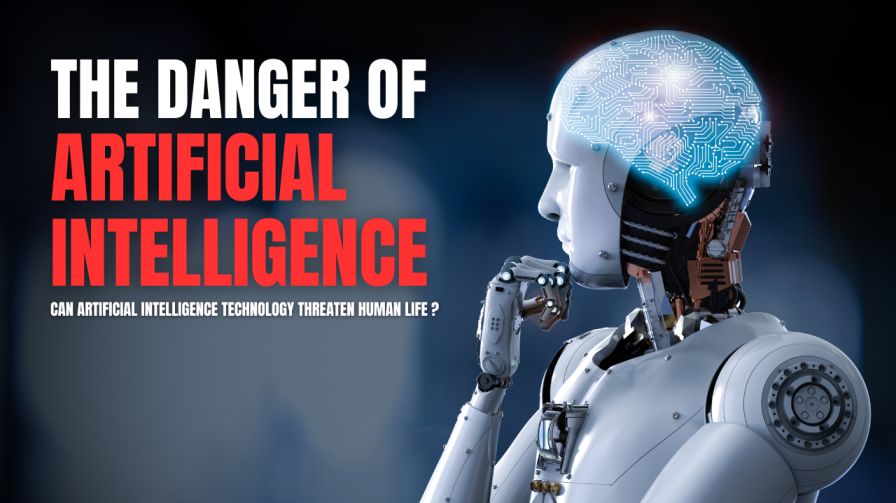The Hidden Perils of Artificial Intelligence:
A Comprehensive Analysis
In the rapidly evolving digital age, artificial intelligence (AI) has emerged as a technological titan, revolutionizing industries and daily lives. However, beneath the sheen of efficiency and innovation, lurks the danger of artificial intelligence. This article delves into the multifaceted risks associated with AI, addressing the ethical, privacy, and security concerns that are paramount in today’s interconnected world.
Understanding the Complex Nature of AI Risks
Artificial intelligence, at its core, is a creation of human intellect, designed to mimic cognitive functions. Yet, this replication process is not without its pitfalls. As AI systems become more autonomous, the ethical implications of their decisions become a significant concern. The potential for AI to perpetuate biases, make erroneous decisions, and impact human lives raises pressing ethical questions that must be addressed.
Moreover, the integration of AI in various sectors, from healthcare to finance, heightens privacy concerns. The vast amounts of data these systems process can lead to unprecedented privacy breaches if not adequately safeguarded. This data, in the hands of AI, can be a tool for unparalleled service delivery or a weapon for invasive surveillance.
The Security Conundrum in AI Deployment
Another crucial aspect of the danger of artificial intelligence lies in security vulnerabilities. AI systems, while sophisticated, are not immune to cyber attacks. These attacks can range from data breaches to more sinister forms of manipulation, where AI algorithms are tampered with to produce harmful outcomes. The dependency on AI in critical infrastructure and national defense systems further exacerbates these security risks, making the need for robust protective measures imperative.
AI and Job Displacement:
A Socio-Economic Challenge
The impact of AI on the job market cannot be overlooked. Automation, powered by AI, poses a significant threat to job security across various sectors. The displacement of human labor by machines is a reality that is already unfolding, creating socio-economic challenges that need to be addressed proactively. While AI can create new job opportunities, the transition for many workers can be daunting, necessitating strategies for re-skilling and education.
Regulating AI:
Striking the Right Balance
The question of regulating artificial intelligence is a complex one. Over-regulation could stifle innovation and the growth of AI, while under-regulation could lead to the unchecked proliferation of harmful AI practices. Finding a balance is crucial. Governments and international bodies need to collaborate to establish guidelines that foster ethical AI development while protecting society from its potential harms.
The Future of AI:
Responsible Innovation
Looking towards the future, the focus must be on responsible innovation in the field of artificial intelligence. This involves not only technological advancements but also a strong ethical framework that guides AI development. Stakeholder engagement, including public discourse, industry regulations, and academic research, plays a vital role in shaping a future where AI is a force for good, not a source of peril.
Conclusion:
In conclusion, while artificial intelligence offers boundless opportunities, its dangers cannot be ignored. It is imperative to approach AI with a sense of caution and responsibility. By understanding and addressing the ethical, privacy, and security concerns, society can harness the power of AI while safeguarding against its potential perils.
FAQs
How fast is AI advancing and what industries will it impact the most?
Faster than a toddler who’s spotted a jar of cookies! AI’s evolutionary speed is quite remarkable and what’s more exciting is it’s not specific to an industry—it’s sprawling across sectors. Retail, healthcare, transportation, manufacturing, you name it, AI is leaving its footprints. Will AI Robots Take Your Job
Will AI completely eliminate the need for human work?
In a word, nope! AI is set to automate tasks, not steal jobs. The human brain’s creativity and emotional intelligence aren’t going on vacation anytime soon, and these are traits that AI is far from mastering. Humans and AI? Two peas in a productive pod!
C. What steps can individuals take now to secure their jobs against the rise of AI?
Get on the ‘learning express’, folks. So Upskilling and reskilling are two major keys to future-proof your careers. Stay updated about your industry’s progression with AI, adapt and navigate through the landscape with your newly brushed up skills!
D. How can AI be used to create new job opportunities?
AI is not just a ‘job-vanishing’ machine; it’s also a ‘job-manufacturing’ factory. Because with our AI-dependent future, fresh and novel roles are quickly emerging. So AI ethics manager, AI trainer, Data Detective, — sounds exciting, doesn’t it?
E. How can we make the transition into an AI-driven world smoother and more Overall?
Instead of Fighting the AI wave, let’s surf it! Open dialogues and discussions, clear communication about AI’s role, Overall AI policies, and most importantly, a willingness to adapt and evolve — these could help ensure a smoother and softer landing into the AI territory!
Discover More Blogs:

This post was truly worthwhile to read. I wanted to say thank you for the key points you have pointed out as they are enlightening.